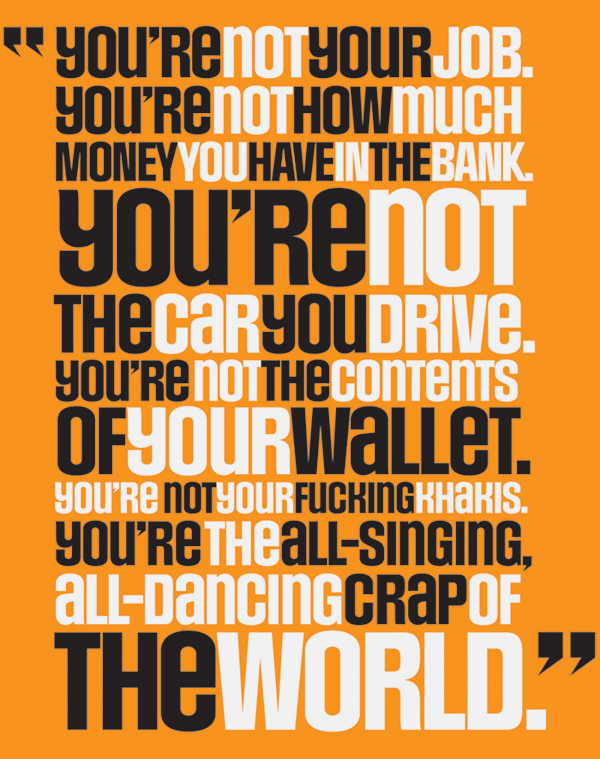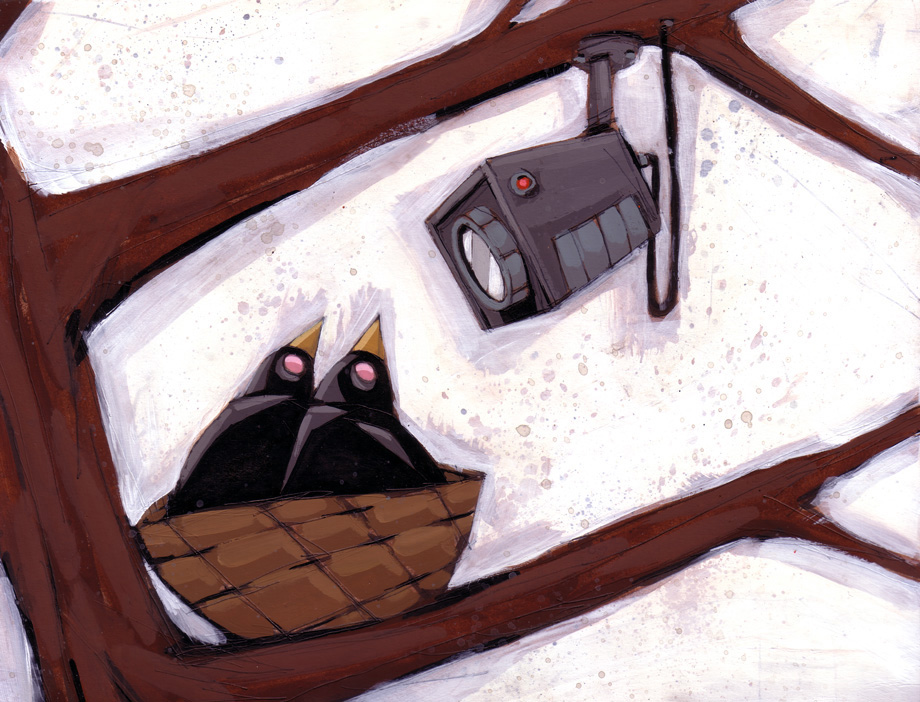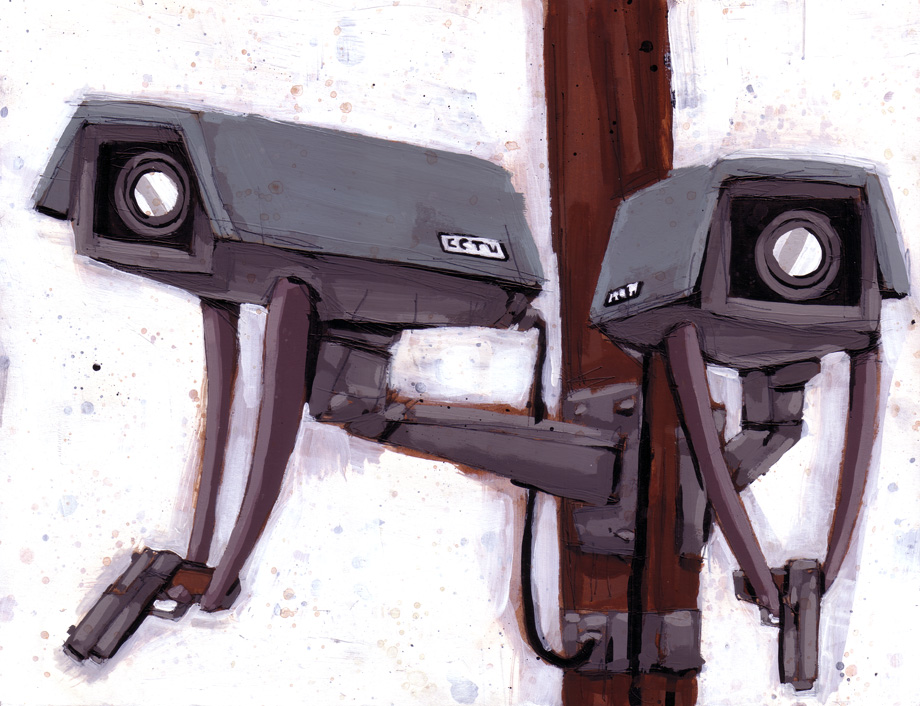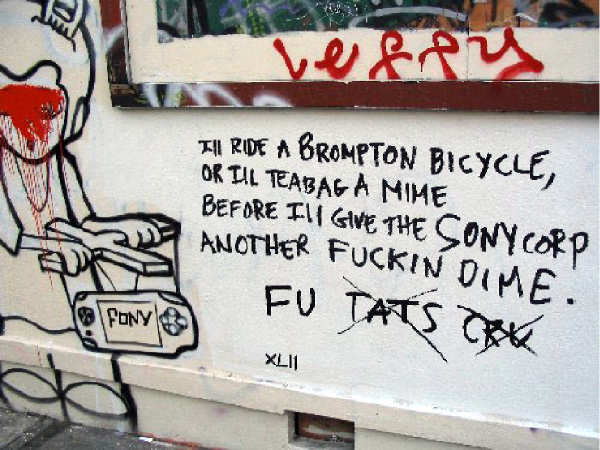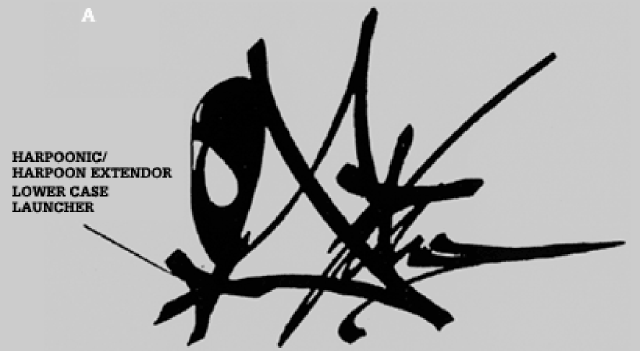Thursday, December 23, 2010
Monday, December 20, 2010
Sapun pentru creiere
Tags:
babylon,
bullshit,
control,
fuckit,
hpr.,
print,
resistance,
sapun pentru creiere,
stiker,
TV
Wednesday, December 15, 2010
Ukrainian Banksy
 A Ukrainian street artist that calls himself “Sharik” is creating amazing art in the streets of Simferopol. He uses paint to make fun and thoughtful graffiti on concrete walls of different buildings, or just on huge rocks and blocks. People call him the “Ukrainian Banksy”.
A Ukrainian street artist that calls himself “Sharik” is creating amazing art in the streets of Simferopol. He uses paint to make fun and thoughtful graffiti on concrete walls of different buildings, or just on huge rocks and blocks. People call him the “Ukrainian Banksy”.sursa: ruthenia.wordpress.com

Friday, December 10, 2010
Tuesday, November 23, 2010
Hypnagogia

Hypnagogia (Greek ὕπνος, húpnos "sleep" away" etc.), alternatively hypnogogia, is a term coined by Alfred Maury for the transitional state between wakefulness and sleep (i.e. the onset of sleep). The equivalent transition to wakefulness is termed the hypnopompic state. Mental phenomena that occur during this "threshold consciousness" phase include lucid dreaming, hallucinations, out of body experiences and sleep paralysis.
Threshold consciousness (commonly called "half-asleep" or "half-awake", or "Mind Awake Body Asleep") describes the same mental state of someone who is moving towards sleep or wakefulness but has not yet completed the transition. Such transitions are usually brief, but can be extended by sleep disturbance or deliberate induction, for example during meditation.
imaginea de pe coperta:grzesiek pe deviantart
Hypnagogia pe wikipedia
Friday, November 19, 2010
"Plans will change, but don’t lose the structures that enable you to change them in unison."
"Remember that the police won’t be able to make mass arrests unless they have lots of plastic handcuffs and vans or buses in the area, so these can be a good tip-off for what to expect. The same goes for chemical weapons; if they’re ready to use tear gas, they’ll all be wearing gas masks themselves."
"The police are restricted in what they can do by what public opinion will decree about it; you are limited in what you can do by a similar question, for whenever you move up to a more confrontational tactic the police will immediately upgrade their tactics to a level higher than yours.
[...] we always permit our opponents the more powerful tools, in order to keep the violence from getting too out of hand - and, of course, to show off how much more noble and courageous we are! If the papers read (as they have before) “Violence erupted when activists began throwing back tear gas canisters fired by the police,” it will be clear to everyone what’s going on."
"Whether or not an action is illegal is a poor measure of whether or not it is just [...]
To object to an action on the grounds that it is illegal is to sidestep the more important question of whether or not it is ethical. To argue that we must always obey laws, even when we consider them to be unethical or to enforce unethical conditions, is to suggest that the arbitrary pronouncements of the legal establishment possess a higher moral authority than our own consciences, and to demand complicity in the face of injustice. When laws protect injustice, illegal activity is no vice, and law-abiding docility is no virtue."
"If [surveillance] cameras are necessary on every corner, then something is fundamentally wrong in our society, and getting rid of the cameras is as good a starting place as any."
"In the collective unconscious of our society, the police are the ultimate bastion of reality, the force that ensures that things stay the way they are; to fight them and win, however temporarily, is to show that reality is negotiable."
from crimethinc.com
"Remember that the police won’t be able to make mass arrests unless they have lots of plastic handcuffs and vans or buses in the area, so these can be a good tip-off for what to expect. The same goes for chemical weapons; if they’re ready to use tear gas, they’ll all be wearing gas masks themselves."
"The police are restricted in what they can do by what public opinion will decree about it; you are limited in what you can do by a similar question, for whenever you move up to a more confrontational tactic the police will immediately upgrade their tactics to a level higher than yours.
[...] we always permit our opponents the more powerful tools, in order to keep the violence from getting too out of hand - and, of course, to show off how much more noble and courageous we are! If the papers read (as they have before) “Violence erupted when activists began throwing back tear gas canisters fired by the police,” it will be clear to everyone what’s going on."
"Whether or not an action is illegal is a poor measure of whether or not it is just [...]
To object to an action on the grounds that it is illegal is to sidestep the more important question of whether or not it is ethical. To argue that we must always obey laws, even when we consider them to be unethical or to enforce unethical conditions, is to suggest that the arbitrary pronouncements of the legal establishment possess a higher moral authority than our own consciences, and to demand complicity in the face of injustice. When laws protect injustice, illegal activity is no vice, and law-abiding docility is no virtue."
"If [surveillance] cameras are necessary on every corner, then something is fundamentally wrong in our society, and getting rid of the cameras is as good a starting place as any."
"In the collective unconscious of our society, the police are the ultimate bastion of reality, the force that ensures that things stay the way they are; to fight them and win, however temporarily, is to show that reality is negotiable."
from crimethinc.com
Wednesday, November 10, 2010
Tax resistance
 Tax resistance is the refusal to willingly pay a tax because of opposition to the institution that is imposing the tax, or to some of that institution’s policies.
Tax resistance is the refusal to willingly pay a tax because of opposition to the institution that is imposing the tax, or to some of that institution’s policies.Some tax resisters refuse to pay all or a portion of the taxes due, but then make an equivalent donation to charity. In this way, they demonstrate that the intent of their resistance is not selfish and that they want to use a portion of their earnings to contribute to the common good.
For instance, Julia Butterfly Hill resisted about $150,000 in federal taxes, and donated that money to after school programs, arts and cultural programs, community gardens, programs for Native Americans, alternatives to incarceration, and environmental protection programs. She said:
I actually take the money that the IRS says goes to them and I give it to the places where our taxes should be going. And in my letter to the IRS I said: “I’m not refusing to pay my taxes. I’m actually paying them but I’m paying them where they belong because you refuse to do so.”
sursa: wikipedia.org
Friday, November 5, 2010
"The early theories make no distinction between defense of the person and defense of property. Whether consciously or not, this builds on the Roman Law principle of dominium where any attack on the members of the family or the property it owned was a personal attack on the pater familias – the male head of the household, sole owner of all property belonging to the household, and endowed by law with dominion over all his descendants through the male line no matter their age."
de pe wikipedia.org
Endlessly creating myself
"... There are in every part of the world men who search. I am not a prisoner of history. I should not seek there for the meaning of my destiny. I should constantly remind myself that the real leap consists in the introduction of invention into existence. In the world through which I travel, I am endlessly creating myself..."
Frantz Fanon in Black Skin, White Masks, 1952
Tags:
bullshit,
destin,
fragmente,
gru,
spre ce naiba ne indreptam?
Friday, October 29, 2010
Tuesday, October 19, 2010
The Black Bloc
The Black Bloc is not an organization. It has no leaders. Like a spectre, it simply appears out of nowhere, wreaks havoc, then vanishes.
 Nobody speaks for anybody in this group. They’re totally organic structures of people that come together in a certain time and place, and then they dissolve. Their actions are reactive to the police presence as well as the tenseness of the situation. "The Black Bloc" is sometimes incorrectly reported as being the name of a specific anarchist group. It is rather a tactic that may be adopted by groups of various motivations and methods.
Nobody speaks for anybody in this group. They’re totally organic structures of people that come together in a certain time and place, and then they dissolve. Their actions are reactive to the police presence as well as the tenseness of the situation. "The Black Bloc" is sometimes incorrectly reported as being the name of a specific anarchist group. It is rather a tactic that may be adopted by groups of various motivations and methods. Tactics of a Black Bloc can include vandalism, rioting and street fighting, demonstrating without a permit, misleading the authorities, assisting in the escape of people arrested by the police, administering first aid to persons affected by tear gas in areas where protesters are barred from entering, building barricades, and attacking police. Property destruction carried out by Black Blocs tends to have symbolic significance: common targets include banks, institutional buildings, outlets for multinational corporations, gasoline stations, and video-surveillance cameras.
Tactics of a Black Bloc can include vandalism, rioting and street fighting, demonstrating without a permit, misleading the authorities, assisting in the escape of people arrested by the police, administering first aid to persons affected by tear gas in areas where protesters are barred from entering, building barricades, and attacking police. Property destruction carried out by Black Blocs tends to have symbolic significance: common targets include banks, institutional buildings, outlets for multinational corporations, gasoline stations, and video-surveillance cameras. Each participant of a Black Bloc wears somewhat of a "uniform". The clothing is used to avoid being identified, and to appear as one large mass, promoting solidarity or creating the illusion of a larger group. If every single person in the Bloc looks relatively alike, it is hard for the police to determine which individual did what. For instance, if a Black Bloc participant throws a brick at a store window and runs into the Bloc, he will easily blend in with everyone else.
Each participant of a Black Bloc wears somewhat of a "uniform". The clothing is used to avoid being identified, and to appear as one large mass, promoting solidarity or creating the illusion of a larger group. If every single person in the Bloc looks relatively alike, it is hard for the police to determine which individual did what. For instance, if a Black Bloc participant throws a brick at a store window and runs into the Bloc, he will easily blend in with everyone else.The black hooded sweatshirt offers great protection in many ways. It protects the back of the neck and sides of the head from pepper spray and other chemical agents. Police often occupy rooftops and use helicopters in order to gain overhead perspective when filming and photographing the Bloc. The hooded sweatshirt helps protect you from these perspectives by covering your head and therefore making it difficult to draw any distinctions. All logos, patches, or anything else that can help the police distinguish you from anyone else should be removed or left at home.
Average black workers pants are fine. Black military-style cargo pants are extremely recommended. The cargo pockets can hold any items of use that you may have. All distinguishing characteristics must be removed.
The mask is one of the most important aspects of the equipment. The mask you wear should show nothing more than your eyes.
Ski Mask: We recommend the masks that only have holes for your eyes. If you can only find the kind with the three holes, then that will work. Just take a black piece of cloth and fill the mouth hole.
Bandana: An average black bandana that is tied around your mouth will work too. When choosing this mask, wear something over the top part of your head, such as a simple baseball hat or hood. If your hair and rest of your upper head are exposed, it is not hard to tell who you are.
Gas Mask: Useful if you plan on engaging in some heavy street combat. Tear gas is a widely used deterrent in street battles, and you should not be forced to turn away from your goal because of some gas. In most cases the ones wearing the gas masks are the ones throwing the gas canisters back at the police. Wearing a gas mask is an illegal practice and should be worn with caution.


In developing defensive-offense tactics, your bodies cant provide for everything you have to do in battle. That is why you need to be prepared with the proper tools to execute your goal.
These can include, but are not limited to:
Slingshot: Very effective when used by large groups at once. Should be used with 9 mm to 12 mm steel balls. Here is how you build one.
Smoke Bombs: They are great when dealing with illegal situations. It can shield any media or police cameras from catching anyone on film participating in an illegal act. It can also disorient the police when they are advancing on the crowd. For construction methods, click here.
Spray Cans: These are a very effective and educating method of property destruction. Slogans and symbols can be sprayed on rough surfaces such as brick or concrete walls that are a real bitch to remove. Paint applied on a riot cop's face-mask will mean he has to take it off. Wear gloves to keep the evidence off of you. Any trace of paint on your hands will make it damned hard to deny doing it.
Caltrops: Easy to make, and quite an effective way of stopping cars. To make them, simply bend together two pieces of steel rod and weld in a way that no matter which way the device falls one point is sticking straight up (picture). Make sure that these nails are both long (10 cm or longer) and thick (at least 5 mm) as car tires have a really thick outer layer. Sprinkle these across a road to prevent four-wheeled intruders. They will flatten normal police car tires in under a second.
Rope and marbles: Can be used as tangle-foot for massed riot troops or horses when well anchored off to utility poles or fire hydrants. Marbles in large numbers on hard pavement will trip a horse and panic them.
Clubs: Besides being mostly non lethal when used against the leg muscles, they are normally able to incapacitate in one or two strikes. Baseball bats are the baseline, a police collapsible baton is an excellent choice for concealment, length when extended and effectiveness in bruising an attacker to the point that they retreat or go to the ground.
Unarresting
Going to demonstrations comes with the chance of arrest, especially with the Black Bloc. Unarresting is the practice of pulling your comrades back into safety from the arms of the officers. This is a serious topic that needs to be discussed and practiced.
Most Blocs use the tactic of linking arms. This way, when an officer tries to pull one of them away, it makes it difficult to pull the individual from the arms of the other participants.
 Often times, a demonstrator will get isolated from the group and suddenly be taken by an officer. Don't let anyone stray from the group. If someone does happen to stray and be detained, there are some things you can do if you act quickly: let everyone know what is happening and have your group run to the area of the situation. If the cop does not back away by the time you arrive to this situation, your group can fall on top of the person in a pile, and more people will gather around the situation. Make sure you do not harm the person you are attempting to unarrest. You can also get a few people to simply pull him away from the officer.
Often times, a demonstrator will get isolated from the group and suddenly be taken by an officer. Don't let anyone stray from the group. If someone does happen to stray and be detained, there are some things you can do if you act quickly: let everyone know what is happening and have your group run to the area of the situation. If the cop does not back away by the time you arrive to this situation, your group can fall on top of the person in a pile, and more people will gather around the situation. Make sure you do not harm the person you are attempting to unarrest. You can also get a few people to simply pull him away from the officer.
Remember! Unarresting someone is a very risky circumstance. In some cases, you can be given a harsher charge than the person you are unarresting.
De-Bloc'ing
At all demonstrations, it's often that people are picked up on the way from an action. When leaving a demonstration, you should always leave wearing something different than how you came. When walking away from the scene of a demonstration, remember not to ever be alone. If for some reason you came to the demonstration by yourself, just ask someone that is in a large group if you can walk with them.


Be creative. Think of some new ideas for de-Bloc'ing. Scope out the area of the demonstration before hand and find some good secure places to escape to.
Besides getting away with public criminal acts, there are other reasons to act in a Bloc. Bloc participation can be really exciting, and good for morale—acting in a mass of people who are ostensibly prepared to do what they believe is right regardless of police intimidation is often a hell of a lot more empowering than chanting weakly with the liberals; matching battle-dress is a ritual for inspiring courage that need not be abandoned to our uniformed enemies.
Sources: mlcastle.net, wikipedia, thestar.com, crimethinc.com
NOTE: Apparently, this is the one blog post that attracts most readers. Perhaps because of the strange days we are all living. Note that I do not endorse violence; all you can read in this article is pure theory. It is meant to show that people are able to resist police abuse, not to encourage violent protests. Oh, and leave a comment while you're here.
Further reading: How riot control works
The mask is one of the most important aspects of the equipment. The mask you wear should show nothing more than your eyes.
Ski Mask: We recommend the masks that only have holes for your eyes. If you can only find the kind with the three holes, then that will work. Just take a black piece of cloth and fill the mouth hole.
Bandana: An average black bandana that is tied around your mouth will work too. When choosing this mask, wear something over the top part of your head, such as a simple baseball hat or hood. If your hair and rest of your upper head are exposed, it is not hard to tell who you are.
Gas Mask: Useful if you plan on engaging in some heavy street combat. Tear gas is a widely used deterrent in street battles, and you should not be forced to turn away from your goal because of some gas. In most cases the ones wearing the gas masks are the ones throwing the gas canisters back at the police. Wearing a gas mask is an illegal practice and should be worn with caution.


In developing defensive-offense tactics, your bodies cant provide for everything you have to do in battle. That is why you need to be prepared with the proper tools to execute your goal.
These can include, but are not limited to:
Slingshot: Very effective when used by large groups at once. Should be used with 9 mm to 12 mm steel balls. Here is how you build one.
Smoke Bombs: They are great when dealing with illegal situations. It can shield any media or police cameras from catching anyone on film participating in an illegal act. It can also disorient the police when they are advancing on the crowd. For construction methods, click here.
Spray Cans: These are a very effective and educating method of property destruction. Slogans and symbols can be sprayed on rough surfaces such as brick or concrete walls that are a real bitch to remove. Paint applied on a riot cop's face-mask will mean he has to take it off. Wear gloves to keep the evidence off of you. Any trace of paint on your hands will make it damned hard to deny doing it.
Caltrops: Easy to make, and quite an effective way of stopping cars. To make them, simply bend together two pieces of steel rod and weld in a way that no matter which way the device falls one point is sticking straight up (picture). Make sure that these nails are both long (10 cm or longer) and thick (at least 5 mm) as car tires have a really thick outer layer. Sprinkle these across a road to prevent four-wheeled intruders. They will flatten normal police car tires in under a second.
Rope and marbles: Can be used as tangle-foot for massed riot troops or horses when well anchored off to utility poles or fire hydrants. Marbles in large numbers on hard pavement will trip a horse and panic them.
Clubs: Besides being mostly non lethal when used against the leg muscles, they are normally able to incapacitate in one or two strikes. Baseball bats are the baseline, a police collapsible baton is an excellent choice for concealment, length when extended and effectiveness in bruising an attacker to the point that they retreat or go to the ground.
Unarresting
Going to demonstrations comes with the chance of arrest, especially with the Black Bloc. Unarresting is the practice of pulling your comrades back into safety from the arms of the officers. This is a serious topic that needs to be discussed and practiced.
Most Blocs use the tactic of linking arms. This way, when an officer tries to pull one of them away, it makes it difficult to pull the individual from the arms of the other participants.
 Often times, a demonstrator will get isolated from the group and suddenly be taken by an officer. Don't let anyone stray from the group. If someone does happen to stray and be detained, there are some things you can do if you act quickly: let everyone know what is happening and have your group run to the area of the situation. If the cop does not back away by the time you arrive to this situation, your group can fall on top of the person in a pile, and more people will gather around the situation. Make sure you do not harm the person you are attempting to unarrest. You can also get a few people to simply pull him away from the officer.
Often times, a demonstrator will get isolated from the group and suddenly be taken by an officer. Don't let anyone stray from the group. If someone does happen to stray and be detained, there are some things you can do if you act quickly: let everyone know what is happening and have your group run to the area of the situation. If the cop does not back away by the time you arrive to this situation, your group can fall on top of the person in a pile, and more people will gather around the situation. Make sure you do not harm the person you are attempting to unarrest. You can also get a few people to simply pull him away from the officer.Remember! Unarresting someone is a very risky circumstance. In some cases, you can be given a harsher charge than the person you are unarresting.
De-Bloc'ing
At all demonstrations, it's often that people are picked up on the way from an action. When leaving a demonstration, you should always leave wearing something different than how you came. When walking away from the scene of a demonstration, remember not to ever be alone. If for some reason you came to the demonstration by yourself, just ask someone that is in a large group if you can walk with them.


Be creative. Think of some new ideas for de-Bloc'ing. Scope out the area of the demonstration before hand and find some good secure places to escape to.
Besides getting away with public criminal acts, there are other reasons to act in a Bloc. Bloc participation can be really exciting, and good for morale—acting in a mass of people who are ostensibly prepared to do what they believe is right regardless of police intimidation is often a hell of a lot more empowering than chanting weakly with the liberals; matching battle-dress is a ritual for inspiring courage that need not be abandoned to our uniformed enemies.
Sources: mlcastle.net, wikipedia, thestar.com, crimethinc.com
NOTE: Apparently, this is the one blog post that attracts most readers. Perhaps because of the strange days we are all living. Note that I do not endorse violence; all you can read in this article is pure theory. It is meant to show that people are able to resist police abuse, not to encourage violent protests. Oh, and leave a comment while you're here.
Further reading: How riot control works
Tags:
anti-utopie,
babylon,
black,
black bloc,
freedomfighter,
molotov,
people,
politie,
resistance,
riot
Thursday, October 14, 2010
Tuesday, October 12, 2010
Wednesday, October 6, 2010
Tudor Chirila:
"Cititi. Cititi mult. Cititi tot ce va pica in mana. Nu-i mai ascultati doar pe profesori. Cititi orice, fara discernamant. Nimic nu e mai important ca lectura, acum. Apoi, cautati-va intre voi. Vedeti care cititi aceleasi lucruri si inhaitati-va. Numai in haita de oameni destepti o sa reusiti. Unul singur dintre voi va fi mancat. Zece insa, s-ar putea sa reusiti. Ganditi-va de pe acum sa-i inlocuiti. Timpul lor trebuie sa se termine. Trebuie sa-i dominati. Dar nu cu gandul ca veti fura mai mult ca ei. Asta e calea simpla care va va sufoca mostenitorii. Ce-o sa faceti cu milioanele intr-un oras mort? Ce-o sa cumparati, cu banii gramezi? La ce-ti foloseste un Lamborghini cand n-ai o autostrada? De ce sa ai o vila intr-un cartier sufocat de inundatii?"
De pe blogul lu' Tudor Chirila, restul aici
Tuesday, October 5, 2010
The Black Panther Party for Self-Defense
 Formed in 1966, the Black Panther Party for Self Defense was the largest Black revolutionary organization that has ever existed.
Formed in 1966, the Black Panther Party for Self Defense was the largest Black revolutionary organization that has ever existed.Famous for taking up guns in defense against police brutality, the Panthers had many other little-known sides to their work. They organized dozens of community programs such as free breakfast for children, health clinics and shoes for children.
restul aici
Tags:
black,
de citit,
organisations,
resistance,
revolution,
shoes
Friday, October 1, 2010
If you are engaging in autonomous civil disobedience...
... and you don’t plan on being arrested, you should conceal your face using a bandanna, or other cloth. When combined with a hat and some sunglasses, this getup makes you nearly impossible to identify via facial recognition.
Wearing a bandanna can make you a target for police, since they associate it with radicals, so only wear one if you are actually doing something illegal and concealing your identity makes sense.
Gas masks and ski masks certainly conceal your identity well, but they look extremely militant, and tend to both incite police violence and frighten other protesters. Unless you plan on directly and forcibly confronting the police, I would not recommend wearing a gas mask. If you think that there will be teargas, you can always have a pair of swim goggles and a bandanna soaked in apple cider vinegar in your pocket.
Also remember that the foam in ski masks and ski goggles will trap teargas and other gasses, after a while this will expose your face to more teargas than wearing nothing at all. Swimming goggles are therefore more advisable.
from stealthiswiki.org
Wearing a bandanna can make you a target for police, since they associate it with radicals, so only wear one if you are actually doing something illegal and concealing your identity makes sense.
Gas masks and ski masks certainly conceal your identity well, but they look extremely militant, and tend to both incite police violence and frighten other protesters. Unless you plan on directly and forcibly confronting the police, I would not recommend wearing a gas mask. If you think that there will be teargas, you can always have a pair of swim goggles and a bandanna soaked in apple cider vinegar in your pocket.
Also remember that the foam in ski masks and ski goggles will trap teargas and other gasses, after a while this will expose your face to more teargas than wearing nothing at all. Swimming goggles are therefore more advisable.
from stealthiswiki.org
Monday, September 27, 2010
Reality is not external
“Only the disciplined mind can see reality, Winston. You believe that reality is something objective, external, existing in its own right. You also believe that the nature of reality is self-evident. When you delude yourself into thinking that you see something, you assume that everyone else sees the same thing as you. But I tell you, Winston, that reality is not external. Reality exists in the human mind, and nowhere else. Not in the individual mind, which can make mistakes, and in any case soon perishes; only in the mind of the Party, which is collective and immortal. Whatever the Party holds to be truth is truth. It is impossible to see reality except by looking through the eyes of the the Party. That is the fact that you have got to relearn, Winston. It needs an act of self-destruction, an effort of the will. You must humble yourself before you can become sane.”
George Orwell, "1984"
Tags:
anti-utopie,
babylon,
de citit,
fragmente,
propaganda
Wednesday, September 22, 2010
Monday, September 20, 2010
"The power of the Executive to cast a man into prison without formulating any charge known to the law, and particularly to deny him the judgment of his peers, is in the highest degree odious and is the foundation of all totalitarian government whether Nazi or Communist."
Winston Churchill, Nov. 21, 1943
Winston Churchill, Nov. 21, 1943
Friday, September 17, 2010
Rhineheart:
You have a problem, Mr. Anderson. You think that you're special.
You believe that somehow the rules do not apply to you.
Obviously, you are mistaken.
(The Matrix, written by Larry and Andy Wachowski, 1996)
You believe that somehow the rules do not apply to you.
Obviously, you are mistaken.
(The Matrix, written by Larry and Andy Wachowski, 1996)
Tags:
anti-utopie,
control,
de citit,
fragmente,
organisations,
rhineheart,
the_end
Florin Iaru:
Există convingerea că nu poţi demantela structurile acestea mafiote, solidificate în 20 de ani...
Ba poţi! Ştiţi cum aş face? Să zicem că suntem la Ministerul de Interne - îi dau o sugestie domnului Blaga, deşi ştiu că nu o să mă asculte -, intru şi mă uit care este cel mai mic în grad. „Tu ce eşti?", „Sublocotenent, să trăiţi!", „Din clipa asta tu eşti şeful! Vii peste o lună şi îmi spui ce măsuri ai luat." Cu entuziasmul tinereţii - pentru că numai atunci funcţionează asta, până n-ai învăţat că sistemul merge - va lua hotărâri. Foarte mulţi tineri nu ştiu că „sistemul" merge şi nu sunt resemnaţi. Ei cred că acesta poate fi oprit, şi atunci chiar poate fi oprit. În 1900, Academia Franţei a decretat că un obiect mai greu decât aerul nu poate zbura. Logic şi ştiinţific, au dreptate. Iată însă că există o portiţă de scăpare prin care dorinţa a fost mai puternică decât logica şi de cât ştiinţa. Dacă voi combina portanţa cu viteza vântului şi cu motorul, voi putea să zbor.
E valabilă analogia cu ceea ce se întâmplă la nivel instituţional în România...
Sigur că da! E suficient să nu ştii că nu se poate, ca să se poată şi în România.
Ba poţi! Ştiţi cum aş face? Să zicem că suntem la Ministerul de Interne - îi dau o sugestie domnului Blaga, deşi ştiu că nu o să mă asculte -, intru şi mă uit care este cel mai mic în grad. „Tu ce eşti?", „Sublocotenent, să trăiţi!", „Din clipa asta tu eşti şeful! Vii peste o lună şi îmi spui ce măsuri ai luat." Cu entuziasmul tinereţii - pentru că numai atunci funcţionează asta, până n-ai învăţat că sistemul merge - va lua hotărâri. Foarte mulţi tineri nu ştiu că „sistemul" merge şi nu sunt resemnaţi. Ei cred că acesta poate fi oprit, şi atunci chiar poate fi oprit. În 1900, Academia Franţei a decretat că un obiect mai greu decât aerul nu poate zbura. Logic şi ştiinţific, au dreptate. Iată însă că există o portiţă de scăpare prin care dorinţa a fost mai puternică decât logica şi de cât ştiinţa. Dacă voi combina portanţa cu viteza vântului şi cu motorul, voi putea să zbor.
E valabilă analogia cu ceea ce se întâmplă la nivel instituţional în România...
Sigur că da! E suficient să nu ştii că nu se poate, ca să se poată şi în România.
dintr-un interviu de George Rădulescu
Friday, September 10, 2010
Sunday, September 5, 2010
Thursday, July 29, 2010
Tuesday, July 20, 2010
Monday, July 12, 2010
[...] Because of the assimilation of the strikes and their transformation into another democratic right, this threat has turned into nothing more than a simple - and this only apparently- happy break from everyday life.
from non-fides.fr
Thursday, July 8, 2010
258+
De la formarea ONU în 1947, lumea a fost martora a 258+ conflicte armate, adică mai multe războaie decat în întreaga sa istorie scrisă până în acel punct. De ce asta? De fiecare data când unul dintre aceste conflicte erupea - de obicei intr-o zona în care nu mai fuseseră războaie, se întâmpla într-un mod în care solicita intervenţia vesticilor... şi de fiecare dată ni s-a spus de către media că aceste intervenţii se petrec pentru a asigura pacea... de fiecare dată ne spuneau "pentru a instaura pacea ne folosim de război", "pacea provine din războaie", "războaiele aduc pace", "războiul e pace" ...este dublu limbaj, in sens orwellian.
Tuesday, July 6, 2010
Monday, July 5, 2010
Unabomber:
204. Revolutionaries should have as many children as they can. There is strong scientific evidence that social attitudes are to a significant extent inherited. No one suggests that a social attitude is a direct outcome of a person's genetic constitution, but it appears that personality traits tend, within the context of our society, to make a person more likely to hold this or that social attitude. Objections to these findings have been raised, but objections are feeble and seem to be ideologically motivated. In any event, no one denies that children tend on the average to hold social attitudes similar to those of their parents. From our point of view it doesn't matter all that much whether the attitudes are passed on genetically or through childhood training. In either case they are passed on.
(from Industrial Society and Its Future by Theodore Kaczynski)
Tags:
control,
future,
resistance,
revolution,
unabomber
Minimanual of the Urban Guerrilla
"The urban guerrilla is an implacable enemy of the regime, and systematically inflicts damage on the authorities and on the people who dominate the country and exercise power. The primary task of the urban guerrilla is to distract, to wear down, to demoralize the military regime and its repressive forces, and also to attack and destroy the wealth and property of the foreign managers and the [...] upper class."
Minimanual of the Urban Guerrilla by Carlos Marighella
Tuesday, June 15, 2010
Thursday, June 3, 2010
Goering:
"Of course the people don't want war. But after all, it's the leaders of the country who determine the policy, and it's always a simple matter to drag the people along whether it's a democracy, a fascist dictatorship, or a parliament, or a communist dictatorship. Voice or no voice, the people can always be brought to the bidding of the leaders. That is easy. All you have to do is tell them they are being attacked, and denounce the pacifists for lack of patriotism, and exposing the country to greater danger."
Herman Goering
Herman Goering
Monday, May 17, 2010
Berlin '45
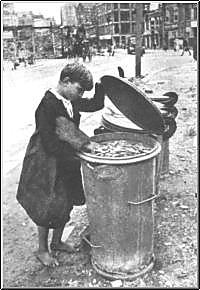 Two new words entered the German vocabulary during 1945:
Two new words entered the German vocabulary during 1945:Hamstern (literally, "to hamster"): This meant to travel into the countryside, in order to exchange possessions for food. Anything from watches and jewelry to blankets and rugs were exchanged for very small amounts of food.
Fringsen: This meant to steal to survive. This word is etymologically based on the surname of Cardinal Josef Frings, a senior figure in the Catholic Church of Cologne, who famously gave his blessing to those who had to steal in order to feed their family.
sursa:wikipedia.org
Friday, May 7, 2010
Magicienii sovietici

În această imagine, Nikolai Yezhov apare alături de Voroshilov, Molotov, şi Stalin vizitând Canalul Marea Albă-Marea Baltică
În această a doua imagine, Yehzov - între timp epurat - a fost eliminat.
"The Great Purge" was a series of campaigns of political repression and persecution in the Soviet Union orchestrated by Joseph Stalin in 1936–1938. It involved a large-scale purge of the Communist Party and Government officials, repression of peasants, Red Army leadership, and the persecution of unaffiliated persons, characterized by widespread police surveillance, widespread suspicion of "saboteurs", imprisonment, and executions. In Russian historiography the period of the most intense purge, 1937–1938, is called Yezhovshchina (Russian: Ежовщина; literally, "The Yezhov Regime"), after Nikolai Yezhov, the head of the Soviet secret police, NKVD.
sursa: wikipedia
"The memory hole" is a metaphor for the alteration or outright disappearance of inconvenient or embarrassing documents, photographs, transcripts, or other records, such as from a web site or other archive, particularly as part of an attempt to give the impression that something never happened. The concept comes from George Orwell's novel, Nineteen Eighty-Four.
sursa: wikipedia
Wednesday, May 5, 2010
Thursday, April 15, 2010
Tuesday, March 2, 2010
Monday, February 22, 2010
Wednesday, February 10, 2010
Thursday, February 4, 2010
Iţkuîl

"On the contrary, I think it may turn out that
this rugged mountain range trails off at some point."
Iţkuîl is a constructed human language marked by outstanding grammatical complexity, expressed with a rich phonemic inventory or through an original, graphically structured, system of writing.
The language’s author, John Quijada, presents Iţkuîl as a cross between an a priori philosophical language and a logical language designed to express deeper levels of human cognition overtly and clearly, yet briefly. The many examples from Quijada’s original grammar show that, in the general case, a message would take significantly longer to explicate in a natural language than in Iţkuîl.
Quijada deems his creation too complex and strictly regular a language to have developed “naturally”, but nonetheless a human-accessible language useful for general conversation and literature. No person is known to be able to speak Iţkuîl fluently; Quijada, for one, does not.
The approximate translation of iţkuîl is “an idea/fantasy of a complete purposeful system of complementary speech elements”, or simply “an imaginary language”.
Sursa: Wikipedia
Wednesday, February 3, 2010
Tuesday, February 2, 2010
Da, sunt încă aici
Altfel vezi viaţa cu un sandviş în stomac, o ţigară în gură, o cafea în mână şi un gram de haşiş în buzunar.
Apropo, nu are nimeni o foiţă?
Apropo, nu are nimeni o foiţă?
Subscribe to:
Posts (Atom)







